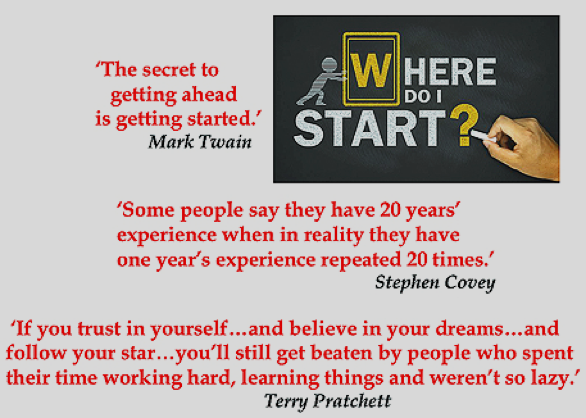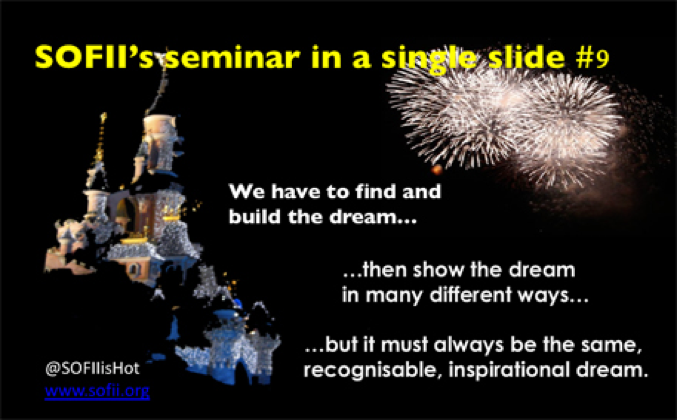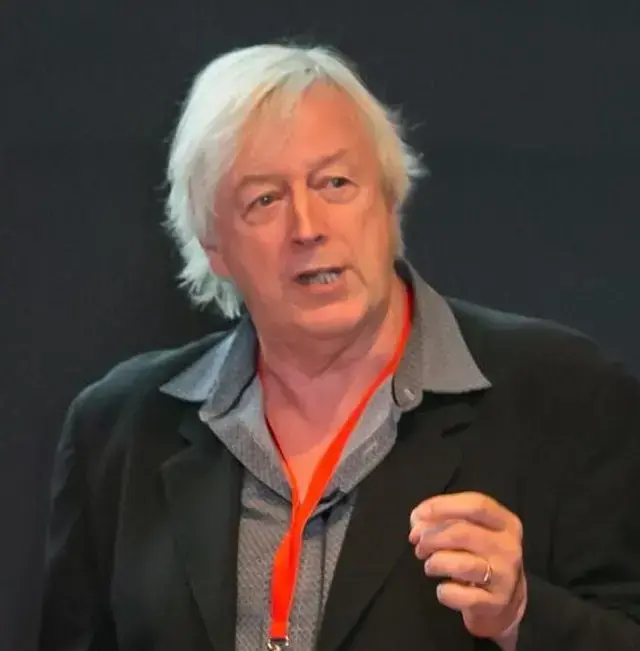My first weeks as a fundraiser: where do I start?
This article was designed to provoke SOFII into creating a major feature detailing and debating how the not-for-profit sector should induct the tens of thousands of new fundraisers who join their ranks each year, many of them only to leave disappointed and disillusioned just a few months later. So, if you are starting out as a fundraiser, where should you start?
- Written by
- Ken Burnett
- Added
- September 20, 2018
Where do I start?
My first three weeks as a fundraiser. And how I might have made more of them.
This short clip from IoF’s FREDtalk interview shows what this feature is all about. Ravinol Chambers’ full interview with Ken Burnett is linked below.
A fundraiser’s first few weeks are likely to be stressful, both for employer and employee. The boss has to put on hold the 101 urgent things on his or her agenda to fill up the hours for the new recruit, who is inevitably more a hindrance than a help during these first few weeks. The new arrival is apt to be at best bewildered, if not completely at sea, the entire time. Unless the process is highly organised, invariably those first weeks will be a challenge for all concerned. Getting them right could have massive benefits for our profession. Far too many talented young entrants don't stay long in fundraising. Everyone would benefit If we could reduce the too high tally of false career starts.

How much better it could so easily be nowadays. Sadly though it isn’t, at least not always.
Several decades on from my first few weeks as a fundraiser I was given an award for having been around a long time. In my acceptance speech I pleaded with the judges, saying I didn’t want any lifetime achievement-type award as it just seemed a bauble to soften the blow of going, a sort of golden goodbye. What I really wanted, I told judges and audience, was for them to give me the award for ‘most promising newcomer’. Now, that’s something I’d commit sin for!
It didn’t happen.
If I could have my first few weeks again (one day, when pigs fly) I’d do things differently for sure. If I were in charge of new recruits and some good fairy gave me enough wishes I’d make it my business to give them all a stunning first few weeks to remember. I’d knock their socks off, make them sit up, dispel their misconceptions and open their eyes to endless possibilities. I’d fill their heads with all the good stuff they need to know, that’ll serve them superbly in the coming decades. Because their purpose is nothing less than to change the world. To have any chance of even denting that difficult task, they need the very best start possible. So…
• I’d summarise the indispensable basics in a digestible form.
• I’d introduce them to some of the great figures and lessons of history.
• I’d set them up with some of fundraising’s best books.
• I’d immerse them in fundraising’s great writers, the power and potential of storytelling and wisely-chosen words.
• I’d frame the culture and ethos that they need to engage and inspire donors.
• I’d share profound sayings that’ll shape their fundraising day by day.
• I’d spread before them the world’s biggest, best collection of fundraising case histories across the 20+ main areas of our profession.
• …and lots more besides. As a sign of how important I think this is, you’ll find below links to all of the above. What follows is all I’ve learned about what a new fundraiser should know, from the start.
A not-so-good start
In many ways my first few weeks weren’t all that great, if I’m honest. There was little guidance around back then: no Institute of Fundraising, no conferences, no good books, no magazines for fundraisers. Nothing. And no SOFII.org – the internet hadn’t been invented. With just a few exceptions I was pretty much left to my own devices and expected to get on with it.
So, if you count yourself among today’s new recruits I really envy you, because there’s now so many sources of help for you. But you have a different kind of problem. For you, there’s just so much stuff around. How do you sort the ‘must haves’ from the ‘merely good to knows’? Our in-boxes are awash with assorted advice. It’s a flood — a tsunami even. Where do you start?
Welcome to your working life!

You’ve just started. It’s day one of the rest of your life, or at least, in your new role as a fundraiser.
There’s a lot to do. Your boss is wondering how to get you up-to-speed in your new profession with minimum delay. You need to sort out what’s essential from what’s merely nice to know. But luckily for you, help is close at hand, 24/7. And it’s free.
There’s more to this than just the mechanics, more than just ‘to-do’ lists and homework to mug up on. Culture, attitudes, aspirations and inspirations count too. For it’s beliefs, values and dependable integrity that should give fundraising its edge over more commercial trade.
Each fundraiser’s first few weeks are vitally important because when they start out, fresh, impressionable and ready for change, newcomers to fundraising are at their peak of possibilities and expectations. It can so easily seem mostly downhill from there. If we leave it till later all hope of change is quickly lost. The distinguished fundraising academic professor Adrian Sargeant recently wrote to me, as follows,
‘…we now have experimental data that indicates that when donors’ genuine needs are attended to giving literally doubles. Deliberately attending to how we make people feel when we communicate makes people feel good (we’ve measured that too) and because it feels good they give more — much more. They’re also more likely to engage in other supportive behaviour.
In an ideal world our profession might have focused on making people feel great when they gave — as a good thing in its own right, whether doing so raised more money or not! But, it turns out, it does raise a lot more money.
The importance of the donor experience should never have been in any doubt — but it does feel sometimes as though we have to “sell” it to people.’
I suggest (if I were your boss I’d insist) that you put that in bold letters above your desk. At least the following gem from it. And shine a light upon it at regular intervals.
…when donors’ genuine needs are attended to, giving literally doubles.
All too often, as soon as some people get into their jobs for even a few months they lose sight of even the most bleedin’ obvious. There must be a syndrome, a medical name for it — the amnesia factor, perhaps, or organisational myopia. The symptoms, invariably, are that day-to-day priorities take over, the basics are elbowed out to make way for targets, silos and internal structures as convenience gets precedence over what the now not-so-young, not-so-fresh fundraiser secretly knows to be right.
So nothing changes. Nor will it change, until some inspired new fundraiser comes along and changes it.
To help, there’s an antidote coming soon on SOFII. It’s called, My first three weeks as a fundraiser. While that’s being prepared, here are some shortcuts to what will really matter in those crucial early days. Of course to sweep up everything that’s likely to fall through the cracks of institutional memory and to fully fill those first few weeks will take an amount of individual tailoring — who to meet, where to go, what to see, etc. But what follows gives a solid base to build on. There are literally hundreds of fundraising treasures linked here. What you — or your new recruits — will make of them is, of course, up to you.
Find your short-cuts, via fundraising’s great books
See The Great Fundraiser’s Bookshelf and The (almost) Complete Fundraiser’s Reading List. These classic works are selected for fundraisers by fundraisers as the books that were most valuable to them, in their careers. If any new fundraiser wants to see further and more clearly than his or her peers get them to stand on a pile of great books.
‘The difference between a good fundraiser and a great fundraiser is a great fundraiser simply knows more.’ David Ogilvy (paraphrased).
From a mountain of inspirational gems, assemble your ‘guiding moments of truth’
‘The market for something to believe in… …is infinite.’
‘Value begins with emotion. The money comes later.’ Hugh MacLeod, The Gaping Void
Over the years I’ve collected hundreds of such soundbites from dozens of inspirational writers. They consistently serve me well (sure, I know I’m lucky. And the harder I work, the luckier I get). The secret to success is to connect these strands of wisdom to what you observe. Here’s a mantra of my own.
‘We have to move from persistent asking to consistent inspiration. And storytelling is brilliant for doing that.’
Ken Burnett, from Advancing Philanthropy, 2016

A new feature coming soon on SOFII is called A Seminar in a Single Slide: a collection of the best of inspirational fundraising wisdom. While we work on that, have a look at these.
• The 34 foundations of fundraising. The best place to start, these are the most precious gems, the absolutely top most important things every fundraiser everywhere really should know from his or her first day.
• The crucial importance of making rice plus, what is a donor?
• The 11 pillars of fundraising wisdom, plus the five assumptions that underpin effective fundraising. How Lawrence of Arabia’s tragic loss is fundraising’s gain.
• Under ‘Inspiration and Effectiveness’, examples of fundraising success, via SOFII’s home page.
• The 6Ps – a blueprint for transforming fundraising.
• The ‘letter to the future’ and 32 lightbulb moments. Some shortcuts to transform fundraising, from the Commission on the Donor Experience.
Meet and spend time with some really smart people
First impressions count. At least, the new recruit should make sure they do. In your first week if not your first day you’ll meet the bosses, of course – CEO, FD, FRD, HR or their representatives. Hopefully, they’re smart and they will guide you. But you should also meet the heroes – sung and unsung – in your organisation. Find who’s famous for how they deal with donors and who can let you listen to the voices of donors and beneficiaries. There are others you must meet, too, at least virtually.
• David Ogilvy, Bruce Barton, Simone Joyaux, Howard Luck Gossage, Kay Grace, George Orwell, Harold Sumption, George Smith, Roger Craver, Giles Pegram, Indra Sinha, Karin Weatherup, Mal Warwick, Lisa Sargent, Tom Ahern – and many more, way too many to mention. Dig around.
• Jerry Huntsinger, and his 55 Tutorials for direct mail.
• Eihei Dogen, Japanese direct mail letter-writer from 1235 (and that’s not 25 minutes to 1.00).
• The data gurus Chuck Longfield and Steve MacLaughlin.
• You should meet some lesser-known giants from the history of voluntary action too – Emmeline Pankhurst and Emmeline Pethick-Lawrence, Dr Thomas Barnardo, William Quarrier, Peter Benenson, Cecil Jackson Cole, Eglantyne Jebb. Octavia Hill… to name but a tiny few. Not to mention Benjamin Waugh, Helen Bamber and David McTaggert (these links will take you to stories of how these folks founded the Suffragette movement, Dr Barnardo’s, Quarriers, Amnesty, Oxfam, ActionAid, Save the Children, National Trust, NSPCC, Freedom from Torture and Greenpeace).
• Here you can meet the hundreds of leading contemporary fundraisers who in 2017 delivered the extraordinary outputs of the Commission on the Donor Experience.
Plus hundreds of instructive, effective campaigns you can study at leisure
First, spend some time with the best of the best. Choose your top 10 all-time great campaigns, then tell your boss why. There are 600+ case histories on SOFII, the biggest, best collection of fundraising case histories in the world. The oldest is here. And is this, the Botton Village story, the best fundraising case history of all time? Or is it this, meet Nana Murphy?
Judge for yourself. Then, check out these priceless swipe files going back more than 3,000 years
SOFII stars is a special feature designed to help you quickly discover fundraising’s best treasures. They’re grouped by subject, so you can easily find what you need.
• The best of fundraising direct mail
• Treasures of legacy marketing
• A selection of fantastic events from around the world
• Fundraising’s golden opportunity – why, how and when to say thank you, properly
Fine writing and free guidance to help you master the issues that matter.
• From the talented Lisa Sargent, an annotated, instructive series of ‘before’ and ‘after’ thank-you letters from around the world.
• Why should God have all the best ideas? How SOFII got started Plus more bright thoughts and lots, lots more rich content, of course, enough to make for a very productive first three weeks. And still that’s not all. (I’m wondering now, where do I stop?)
And sign up now for essential websites and discussion groups, such as Fundraising Chat, The Agitator, UK Fundraising and other top resources too numerous to mention...
With so many blogs worth following from all corners of the world, it really is a challenge to know where to start.
Also just started on SOFII
How to be a World-Changer at Work. Find where you’ll make your difference and how you’re going to change the world. Be inspired. Show and share your passion to inspire others. Even the most important journeys start with single steps. These are yours.
My first three weeks as a fundraiser Continuing and expanding the theme started here, in coming months SOFII will develop a detailed plan for new fundraiser induction that all can share, designed by fundraisers for fundraisers, to make the crucial early stages of starting out as appropriate, painless and as productive as possible. Can you help us, in this vital task?
Contact SOFII to find how you can help make this happen.
© Ken Burnett 2018
This article is also published on the UK Fundraising website.
Watch the full video of Ken's #FREDtalk below.
As a special bonus, just a tiny taste of what might be coming in this new SOFII showcase, check out this series from the ever-brilliant Agitator, on the questions every fundraiser should ask:
How to be an expert novice, from the Agitator, 14 September 2018


















